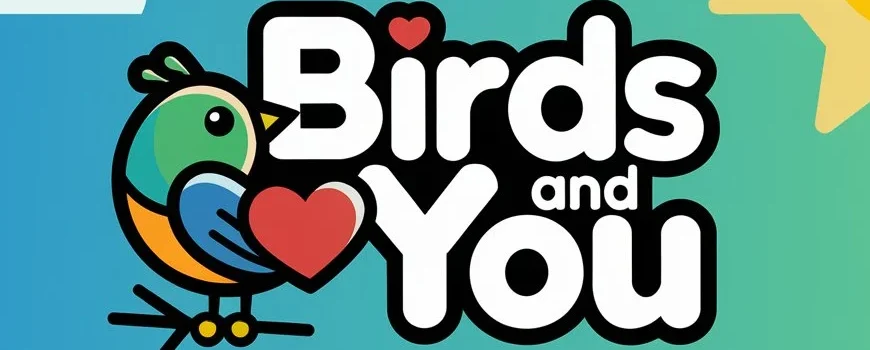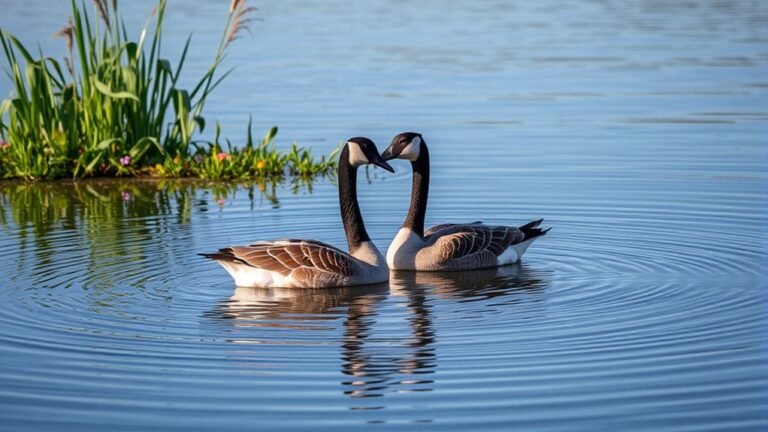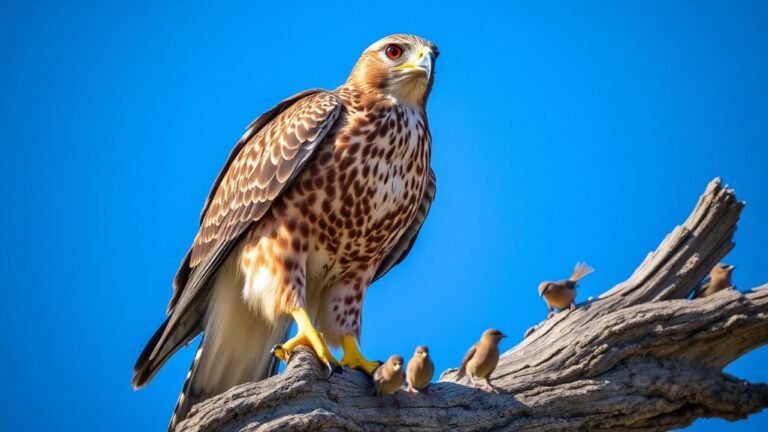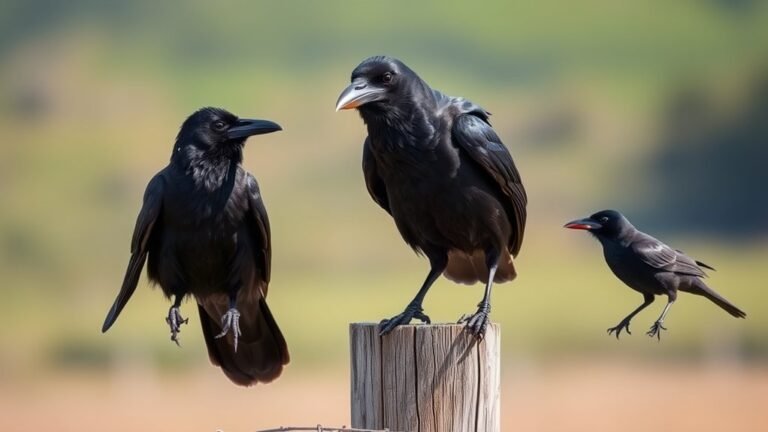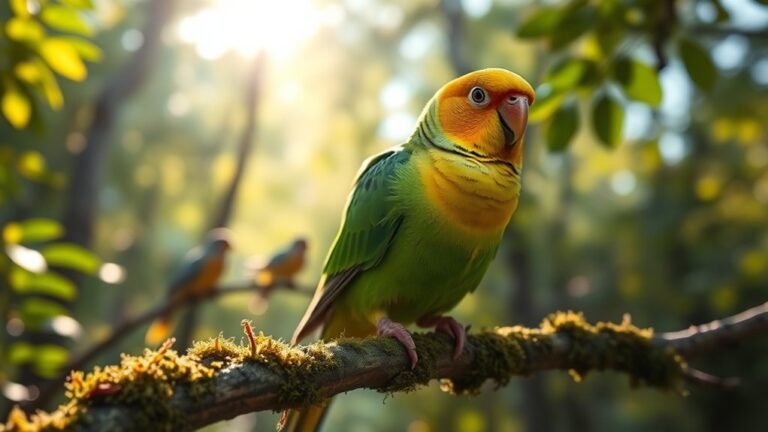Predators of Birds: Who Preys on Our Feathered Friends?
Birds have many predators that make life tough for them. Hawks and eagles are two big bird hunters. They help keep bird numbers down. At the same time, pets like cats and dogs hunt birds differently. Snakes also sneak up on birds to catch them.
Humans affect these natural predator-prey relationships. Changes in the environment can make things harder for birds. This raises questions about how safe these birds are and what their future looks like. What does this mean for birds? Their survival could depend on many factors.
A Quick Overview
Birds have many predators that help control their numbers. Here are some of the main ones:
- Hawks and eagles are raptors that catch weaker or too many birds. They help keep bird populations balanced.
- Domestic cats are great hunters. They catch a lot of small birds, which can lower their numbers.
- Wild dogs work together to hunt medium-sized birds. They use different plans based on where they are.
- Snakes lie in wait and sneak up on birds. This helps keep bird populations in check, too.
- Humans impact birds, too. When we build cities or pollute, we can attract new predators or ruin their homes.
Each of these predators plays a role in nature. They help maintain a balance in bird populations, which is important for the environment.
The Role of Raptors in Bird Populations

Many people love birds because they're pretty and graceful.
But we often forget how important raptors, like hawks and eagles, are for keeping bird populations healthy.
Raptors are good at spotting their prey from far away and have strong hunting skills. They focus on catching certain birds that might reproduce too much. This helps keep the bird population balanced. When raptors keep the numbers of weaker or sick birds in check, the overall bird community becomes healthier.
Raptors play a big part in nature. They help make sure different types of birds can live together peacefully. Understanding how raptors behave can make us appreciate them more. It helps us feel connected to nature and the birds around us.
Mammalian Hunters: Felines and Canines
Mammals like cats and dogs are important hunters in nature. They both play a big role in controlling bird populations.
Cats, especially domestic ones, show off their hunting skills every day. When they play, they often stalk and pounce, just like they'd in the wild. They enjoy hunting small birds and can be very good at it.
Dogs hunt differently. They like to work together in packs. This teamwork helps them catch medium-sized birds more easily. They use their instincts to chase and corner their prey.
Both cats and dogs change how they hunt based on their surroundings. This makes them strong hunters. Their actions can really affect bird populations.
Understanding how these animals interact with nature helps us appreciate the wildlife around us.
Наблюдение за охотой кошек и собак в своих дворах может стать увлекательным опытом.
Snakes: Stealthy Serpentine Predators
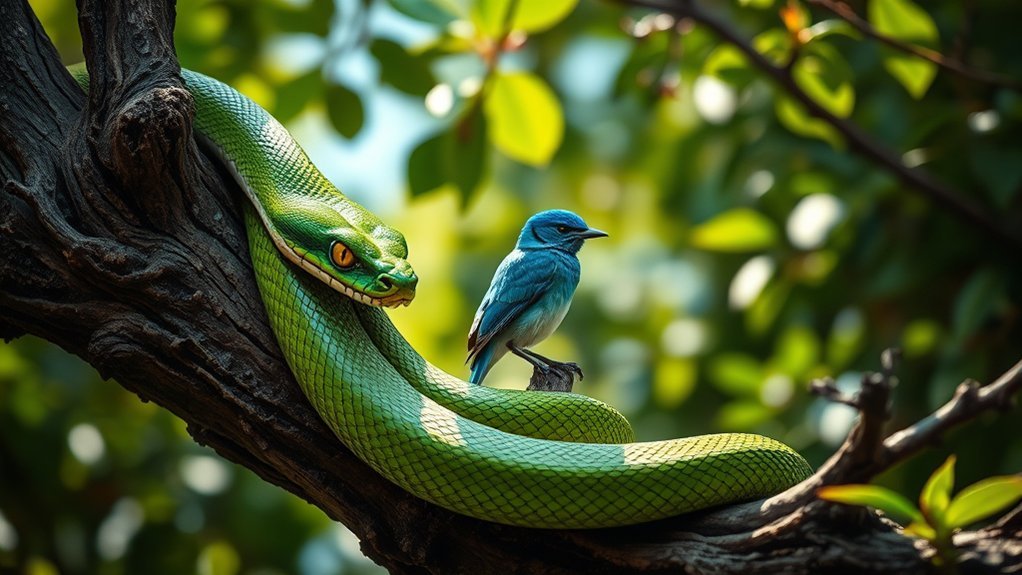
Snakes are amazing hunters in nature. They live in different places, like forests and swamps. Snakes use their colors and patterns to blend in with their surroundings. This helps them stay hidden from birds and other animals.
When hunting, snakes often wait quietly for their prey. They like to surprise birds that come too close. With their quick strikes, they can catch their food easily. Some snakes also wrap around their prey and squeeze tightly to stop them from moving. This shows how skilled they're at hunting.
Snakes play an important role in nature. They help keep the number of birds in check, which helps keep the ecosystem balanced.
Learning about snakes helps us understand how all animals interact in nature. It's fascinating to see how these stealthy predators fit into the bigger picture!
The Impact of Environmental Changes on Bird Predators
Environmental changes affect where birds live and how they interact with predators. When habitats change, it can lead to challenges for birds and their ecosystems. Here's a breakdown of how this happens:
- Predators move around: As places change, predators might find new homes. This can mean more predators in some areas.
- Changes in food: Predators may need to change what they eat if their usual prey becomes hard to find.
- More competition: When more predators are in an area, they might fight over food. This can make it tougher for birds.
- Birds at risk: Birds may struggle to survive when they face new or more dangerous predators.
Avian Predators: Birds That Hunt Other Birds

When you look up at the sky, you might spot different kinds of birds flying around. Some of these birds are hunters. Falcons, hawks, and owls are examples of birds that catch other birds for food. They help control how many birds live in an area.
For example, peregrine falcons are super-fast. They dive down quickly to catch smaller birds that are flying. On the other hand, great horned owls hunt at night. They move quietly and use their sharp eyesight to find prey that doesn't see them coming.
By catching other birds, these predators keep nature in balance. They help stop too many birds from living in one place, which makes sure there's room for many kinds of birds.
Learning about how these birds hunt helps us understand and appreciate nature better. It shows us how everything in nature works together to support bird life around us.
Human Influence on Bird Predation and Survival
Humans often see themselves as separate from nature, but our actions really affect bird survival and how they're hunted. Here are some ways you play a part in this:
- Habitat Loss: As cities grow, birds lose their homes. They've fewer places to nest and find food.
- More Predators: Urban areas attract more animals like cats and raccoons. These predators can threaten birds, especially the ones that are already in danger.
- Light Pollution: Bright lights can confuse migratory birds. They sometimes crash into buildings because they can't see where they're going.
- Chemical Pollution: Pesticides can poison the insects that birds eat. This makes it harder for birds to stay healthy and survive.
Conservation Efforts to Protect Vulnerable Bird Species
Conservation efforts are very important. They help protect birds that are in danger. One big way we can help is by saving their homes. When we keep their habitats safe, we give these birds a better chance to survive and grow.
Another way to help birds is through breeding programs. These programs help increase the number of endangered birds. They also help keep the birds' genes strong.
Plus, they teach people in the community about why birds matter and how they fit into nature.
You can also help! By joining these efforts, you help local birds and feel good about making a difference.
Working together, we can really help birds all over the world.
Frequently Asked Questions
How Do Bird Predators Impact the Ecosystem?
Bird predators play an important role in nature. They help keep the number of birds in check. When there are enough predators, they catch some birds, which keeps the bird population healthy.
If there were no predators, the number of birds could grow too high. This can lead to problems. More birds mean more eating of food. If they eat too much, they can harm their homes, like trees and plants. This can hurt other animals and plants too, reducing the variety of life in the ecosystem.
Which Bird Species Are Most Vulnerable to Predation?
Some songbirds are easy targets for predators. Birds that nest in certain ways or places can be more at risk. When their homes are taken away or they choose risky spots to lay their eggs, it makes it harder for them to survive. This can affect the whole environment around them in little ways.
What Adaptations Do Birds Have Against Predators?
Birds have cool tricks to stay safe from predators. One of their main tricks is camouflage. They use colors and patterns to blend into their surroundings, making it hard for predators to see them.
Another smart move birds make is using alarm calls. When they spot danger, they make loud sounds to alert other birds. This helps everyone stay aware and increases their chances of survival.
These simple yet effective adaptations help birds protect themselves and look out for each other in the wild.
How Can We Help Protect Birds From Predation?
To help protect birds from being eaten by predators, you can do a few simple things. First, set up bird feeders in your yard. This gives birds a safe place to eat. Second, plant trees and bushes to create homes for them. These safe spaces help birds feel secure and keep them from becoming food for other animals. By doing these things, you can support birds and help them live healthy lives.
Are There Any Bird Species That Have No Natural Predators?
Most birds have natural predators. But some birds, like the Ostrich, have strong ways to protect themselves. They are good at avoiding danger. Because of this, they face fewer threats in their homes. This helps them live and grow in their environment.

Luna is the passionate founder and author of Birds and You, a website dedicated to sharing her love for birds with fellow enthusiasts. Through her engaging articles and guides, she aims to educate and inspire others to explore the fascinating world of birds. When she’s not writing, you can find Luna observing birds in their natural habitats or sharing beautiful bird photography on Pinterest. Join her on this journey to celebrate and protect our feathered friends!
